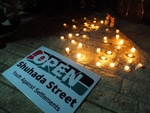29 feb 2016
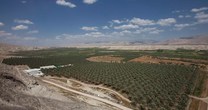
Israeli settlers seized 600 more dunums of private Palestinian lands in 2015 in the northern Jordan Valley which were confiscated by Israeli occupation authorities (IOA) under military pretexts.
According to a report issued by the Haaretz newspaper on Monday, the lands are located near the Jordan River where the IOA prohibited the owners of these lands from entering the area for security reasons.
A so-called Decree 151 issued by the IOA following the occupation of the West Bank in 1967 had banned Palestinians from reaching their own lands in that area.
However, the occupation army allowed the settlers to take profit from the lands after they had built an apartheid wall and a buffer zone under the pretext of limiting infiltration out of and into the Jordan Valley.
In January 2013, Haaretz reported that 5,000 dunums of these lands were being cultivated by the settlers and in 2015 settlers began cultivating an additional 600 dunums.
According to a report issued by the Haaretz newspaper on Monday, the lands are located near the Jordan River where the IOA prohibited the owners of these lands from entering the area for security reasons.
A so-called Decree 151 issued by the IOA following the occupation of the West Bank in 1967 had banned Palestinians from reaching their own lands in that area.
However, the occupation army allowed the settlers to take profit from the lands after they had built an apartheid wall and a buffer zone under the pretext of limiting infiltration out of and into the Jordan Valley.
In January 2013, Haaretz reported that 5,000 dunums of these lands were being cultivated by the settlers and in 2015 settlers began cultivating an additional 600 dunums.
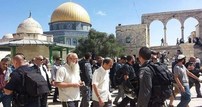
A group of Israeli settlers stormed Monday morning al-Aqsa Mosque via the Israeli-controlled al-Magharibeh gate under heavy police protection.
The settlers tried to perform Talmudic rituals in the holy shrine in clear provocation to the Palestinian worshipers who started shouting Takbeer in protest against the settlers’ provocative presence in the Islamic holy site.
Occupied Jerusalem has witnessed rising tensions over the past five months in protest against Israeli almost-daily break-ins into al-Aqsa Mosque.
The settlers tried to perform Talmudic rituals in the holy shrine in clear provocation to the Palestinian worshipers who started shouting Takbeer in protest against the settlers’ provocative presence in the Islamic holy site.
Occupied Jerusalem has witnessed rising tensions over the past five months in protest against Israeli almost-daily break-ins into al-Aqsa Mosque.
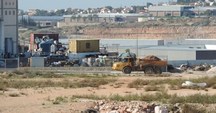
The Palestinian natives of Salfit town warned of Israeli intents to install a cable-car system on Palestinian lands in Qarawat Bani Hassan town.
Local Palestinian farmers said the Israeli occupation authorities prevented them from cultivating their lands while allowing Israelis residing in the Havat Yair illegal settlement to level the lands, build more settlement units, and establish a cable-car system.
Researcher Khaled Maali said the Havat Yair settlement outpost was illegally built in 2001 at the expense of Palestinian lands in northeastern Qarawat Bani Hassan town.
He added that the IOA had been declaring the area a natural reserve to pave the way for more settlement expansion at the same time as it has allowed Israeli settlers to uproot olive trees and wreak havoc on Palestinian crops as part of a larger scheme of ethnic cleansing.
Local Palestinian farmers said the Israeli occupation authorities prevented them from cultivating their lands while allowing Israelis residing in the Havat Yair illegal settlement to level the lands, build more settlement units, and establish a cable-car system.
Researcher Khaled Maali said the Havat Yair settlement outpost was illegally built in 2001 at the expense of Palestinian lands in northeastern Qarawat Bani Hassan town.
He added that the IOA had been declaring the area a natural reserve to pave the way for more settlement expansion at the same time as it has allowed Israeli settlers to uproot olive trees and wreak havoc on Palestinian crops as part of a larger scheme of ethnic cleansing.
28 feb 2016
lethal and non-lethal violence they have to face by settlers, they will not be intimidated by them.
On Wednesday evening, Palestinians and international supporters gathered in an event organised by Youth Against Settlements as part of their Open Shuhada Street campaign. With the importance of this gathering being to stress the vital yet peacefully displayed acts of resistance and defiance against the settlers and Israeli forces’ continuous acts of intimidation, harassment and violence. For the families, the event can and will never be linked to any organisation or party, but will always stay an act of popular resistance any person is invited and welcome to join, as it’s not a one-time event that gives them a feeling of security and solidarity, but the everyday gathering around this symbolic bonfire that is called the ‘tanakeh’ (Arabic word for the barrel the bonfire is lit in).
Candles were lit in commemoration of the victims of the 1994 Ibrahimi Mosque massacre, in which extremist settler Baruch Goldstein murdered 29 and injured more than 120 worshipers in the Ibrahimi Mosque in cold blood. In the aftermath of this heinous massacre, the Ibrahimi Mosque was divided and the main Palestinian market in Shuhada Street completely closed for Palestinians.
While a documentary about this massacre was screened, Israeli forces at the nearby checkpoint detained three Palestinian men and a girl that were on their way to join the event. Two heavily armed Israeli settlers stopped their car next to the Palestinians that had been detained for already more than half an hour for no reason, and getting out of the car threatened Palestinians. Even though they left, another settler, infamous violent Anat Cohen, arrived and slowly and deliberately drove her car into a big group of Palestinians gathered at the side of the road while insulting them through her open car window. The Israeli forces refused to intervene and let her drive off. She immediately made a u-turn and came back, got out of the car and started threatening, intimidating and attacking Palestinians and internationals, hitting them and trying to slap cameras out of their hands.
The whole time, the soldiers at the checkpoint were merely watching and refused to intervene and stop the violent assaults. Instead, as more soldiers arrived, they started violently pushing back the Palestinians.
At the end of an event supposed to peacefully commemorate the heinous massacre committed 22 years ago – two Palestinians had to be brought to hospital as a direct result of Israeli forces’ violent assault on a group of people that were being attacked by an infamously violent settler – apparently the only person the Israeli forces were willing to protect as she was allowed to leave without any consequences for the disruption of the peaceful event, the harassment or the violent assaults.
On Wednesday evening, Palestinians and international supporters gathered in an event organised by Youth Against Settlements as part of their Open Shuhada Street campaign. With the importance of this gathering being to stress the vital yet peacefully displayed acts of resistance and defiance against the settlers and Israeli forces’ continuous acts of intimidation, harassment and violence. For the families, the event can and will never be linked to any organisation or party, but will always stay an act of popular resistance any person is invited and welcome to join, as it’s not a one-time event that gives them a feeling of security and solidarity, but the everyday gathering around this symbolic bonfire that is called the ‘tanakeh’ (Arabic word for the barrel the bonfire is lit in).
Candles were lit in commemoration of the victims of the 1994 Ibrahimi Mosque massacre, in which extremist settler Baruch Goldstein murdered 29 and injured more than 120 worshipers in the Ibrahimi Mosque in cold blood. In the aftermath of this heinous massacre, the Ibrahimi Mosque was divided and the main Palestinian market in Shuhada Street completely closed for Palestinians.
While a documentary about this massacre was screened, Israeli forces at the nearby checkpoint detained three Palestinian men and a girl that were on their way to join the event. Two heavily armed Israeli settlers stopped their car next to the Palestinians that had been detained for already more than half an hour for no reason, and getting out of the car threatened Palestinians. Even though they left, another settler, infamous violent Anat Cohen, arrived and slowly and deliberately drove her car into a big group of Palestinians gathered at the side of the road while insulting them through her open car window. The Israeli forces refused to intervene and let her drive off. She immediately made a u-turn and came back, got out of the car and started threatening, intimidating and attacking Palestinians and internationals, hitting them and trying to slap cameras out of their hands.
The whole time, the soldiers at the checkpoint were merely watching and refused to intervene and stop the violent assaults. Instead, as more soldiers arrived, they started violently pushing back the Palestinians.
At the end of an event supposed to peacefully commemorate the heinous massacre committed 22 years ago – two Palestinians had to be brought to hospital as a direct result of Israeli forces’ violent assault on a group of people that were being attacked by an infamously violent settler – apparently the only person the Israeli forces were willing to protect as she was allowed to leave without any consequences for the disruption of the peaceful event, the harassment or the violent assaults.
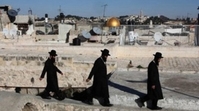
Israeli settlers, on Sunday, resumed their provocative visits to al-Aqsa Mosque compound, in Jerusalem, provoking tension with worshipers.
WAFA correspondence said that dozens of settlers entered the compound in small groups, and toured throughout the holy site, provoking tension with worshipers who protested by chanting religious slogans.
Since the beginning of October 2015, tension has been running high across the West Bank, including Jerusalem and Gaza, against the backdrop of Israel’s repeated assaults on the mosque, including its unilateral enforcement of a temporal division between Muslims and Jews.
Prior to unrest in early October, the Euro Mediterranean Human Rights Monitor pointed out in a report that Israeli incitement and violations against Arabs in Jerusalem have increased dramatically in 2015.
The report, titled “Fire under the Ashes: Provoking Muslims in Jerusalem,” warned that Israeli incitement against Muslims could trigger a conflict that would likely result in disastrous consequences.
“Among the provocative acts documented by Euro-Med researchers against Palestinians in Jerusalem were performance of Talmudic prayers near Muslim worshippers, beating, throwing rubbish, cursing, death threats and preventing worshippers from reaching the mosque,” the report said.
WAFA correspondence said that dozens of settlers entered the compound in small groups, and toured throughout the holy site, provoking tension with worshipers who protested by chanting religious slogans.
Since the beginning of October 2015, tension has been running high across the West Bank, including Jerusalem and Gaza, against the backdrop of Israel’s repeated assaults on the mosque, including its unilateral enforcement of a temporal division between Muslims and Jews.
Prior to unrest in early October, the Euro Mediterranean Human Rights Monitor pointed out in a report that Israeli incitement and violations against Arabs in Jerusalem have increased dramatically in 2015.
The report, titled “Fire under the Ashes: Provoking Muslims in Jerusalem,” warned that Israeli incitement against Muslims could trigger a conflict that would likely result in disastrous consequences.
“Among the provocative acts documented by Euro-Med researchers against Palestinians in Jerusalem were performance of Talmudic prayers near Muslim worshippers, beating, throwing rubbish, cursing, death threats and preventing worshippers from reaching the mosque,” the report said.
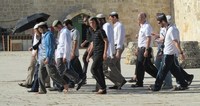
Several Jewish settlers on Sunday morning desecrated the Aqsa Mosque's courtyards in groups under tight police guard.
Local sources in Occupied Jerusalem said that settlers escorted by policemen entered the Mosque through the Israeli-controlled Maghariba Gate.
As a result, Muslim worshipers in the courtyards of the Mosque loudly chanted religious slogans in protest at the presence of Jewish settlers at the Islamic holy site.
Local sources in Occupied Jerusalem said that settlers escorted by policemen entered the Mosque through the Israeli-controlled Maghariba Gate.
As a result, Muslim worshipers in the courtyards of the Mosque loudly chanted religious slogans in protest at the presence of Jewish settlers at the Islamic holy site.
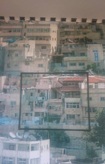
The settlement organization “Ateerat Cohanim” handed the sons of late Abdel Majid Rajabi three judicial reports asking them for their land in the neighborhood of Batn Al-Hawa in Silwan south of Al-Aqsa Mosque which also has a building established on it with 12 residential apartments; 92 individuals live in the building.
Wadi Hilweh Information Center explained in a statement on Friday night that Ateerat Cohanim organization handed Fathi Rajabi, Harbi Rajabi, Talal Rajabi and Yaccoub Rajabi judicial reports asking them for their land. The organization gave the family 20 days to respond to their claims at court; they claim that the land is owned by three Jews from Yemen who used to live and own the land before 1948.
Yaccoub Rajabi, member of Batn Al-Hawa committee and one of those affected, explained that the residential apartments are between 60-70 square meters each where 93 individuals live including 64 children.
Rajabi added that his grandfather Abdel Majid and his sons and grandsons live in the apartments after they had bought the land in 1966 and have all the official documents to prove that.
He added that most of the families in the neighborhood of Batn Al-Hawa are at risk of being evacuated from their home in favor of Ateerat Cohanim settlement organization that claims that Jews from Yemen own the lands. They have received judicial orders and are fighting their cases in the Israeli courts to prove their ownership and refute the settlers’ claims. He pointed out that the organization handed other members of Rajabi family similar orders few days ago.
Wadi Hilweh Information Center explained that Rajabi family building is at risk of being seized fall within the plan of Ateerat Cohanim to seize 5000 square meters from the area of “Batn Al-Hawa”. The plan was revealed by the center last May and claims that Yemen Jews owned the lands since 1881. The area is into 6 sections numbered 73, 75, 88, 95, 96 and 97.
The center explained that the land has between 30-35 residential buildings where more than 80 families consisting of nearly 436 individuals live. All the residents have been living in the neighborhood for many years after buying the lands and property from their previous owners. Court acknowledged Yemen settlers’ ownership of the land of Batn Al-Hawa.
Wadi Hilweh Information Center explained in a statement on Friday night that Ateerat Cohanim organization handed Fathi Rajabi, Harbi Rajabi, Talal Rajabi and Yaccoub Rajabi judicial reports asking them for their land. The organization gave the family 20 days to respond to their claims at court; they claim that the land is owned by three Jews from Yemen who used to live and own the land before 1948.
Yaccoub Rajabi, member of Batn Al-Hawa committee and one of those affected, explained that the residential apartments are between 60-70 square meters each where 93 individuals live including 64 children.
Rajabi added that his grandfather Abdel Majid and his sons and grandsons live in the apartments after they had bought the land in 1966 and have all the official documents to prove that.
He added that most of the families in the neighborhood of Batn Al-Hawa are at risk of being evacuated from their home in favor of Ateerat Cohanim settlement organization that claims that Jews from Yemen own the lands. They have received judicial orders and are fighting their cases in the Israeli courts to prove their ownership and refute the settlers’ claims. He pointed out that the organization handed other members of Rajabi family similar orders few days ago.
Wadi Hilweh Information Center explained that Rajabi family building is at risk of being seized fall within the plan of Ateerat Cohanim to seize 5000 square meters from the area of “Batn Al-Hawa”. The plan was revealed by the center last May and claims that Yemen Jews owned the lands since 1881. The area is into 6 sections numbered 73, 75, 88, 95, 96 and 97.
The center explained that the land has between 30-35 residential buildings where more than 80 families consisting of nearly 436 individuals live. All the residents have been living in the neighborhood for many years after buying the lands and property from their previous owners. Court acknowledged Yemen settlers’ ownership of the land of Batn Al-Hawa.
27 feb 2016
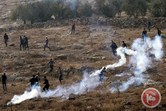
Several Palestinians choked on tear gas on Saturday afternoon after Israeli occupation troops and settlers rolled into Salfit’s eastern village of Yasuf.
Head of the Yasuf village council, Hafed Abeyeh, said several settlers, escorted by occupation troops, stormed the village in an attempt to crack down on the Palestinian civilians and wreak havoc on their homes and properties.
Clashes flared up shortly after the assault and culminated in several suffocation cases among the Palestinian protesters after the occupation patrols showered the area with heavy spates of bullet fire and teargas canisters.
Eyewitnesses said the Israeli soldiers also sealed off the village entrance with a military checkpoint, where Palestinian vehicles and passengers were provocatively inspected. Clashes further rocked the Jenin-Nablus Street, in the northern occupied West Bank, following an ambush set up by the Israeli occupation soldiers.
Three Palestinians were reportedly arrested in the area as they were driving a civilian car. The IOF further chased down and kidnapped an unidentified Palestinian youth at the Dutan checkpoint, in southern Jenin province.
Israeli settlers escorted by army raid village in Salfit district
A group of Israeli settlers escorted by Israeli military forces raided the village of Yasuf in the northern West Bank district of Salfit on Saturday.
The head of the Yasuf village council, Hafith Ebayya, said that a group of Israeli settlers raided the village and attempted to enter the al-Basatin area in central Yasuf.
Ebayya said that the settlers were escorted by military vehicles and soldiers, and that a military checkpoint was set up at the entrance of the village.
Clashes erupted between dozens of Palestinian youths and Israeli forces.
Israeli forces fired live bullets, rubber-coated steel bullets and tear gas at youths and several farmers who were in their fields nearby.
Several youths and farmers suffered from tear gas inhalation.
An Israeli army spokesperson told Ma’an they were looking into the report.
Three quarters of Yasuf’s lands are located in Area C -- under full Israeli military and administrative control. According to a report by the Applied Research Institute-Jerusalem (ARIJ) [PDF], over the years, some 602 dunams (148.7 acres) of Yasuf land have been seized to establish settlement housing.
Several Israeli settlements are located near Yasuf, including Ariel, the fourth largest settlement in the West Bank. These settlements in the occupied West Bank and East Jerusalem are illegal under international law.
Head of the Yasuf village council, Hafed Abeyeh, said several settlers, escorted by occupation troops, stormed the village in an attempt to crack down on the Palestinian civilians and wreak havoc on their homes and properties.
Clashes flared up shortly after the assault and culminated in several suffocation cases among the Palestinian protesters after the occupation patrols showered the area with heavy spates of bullet fire and teargas canisters.
Eyewitnesses said the Israeli soldiers also sealed off the village entrance with a military checkpoint, where Palestinian vehicles and passengers were provocatively inspected. Clashes further rocked the Jenin-Nablus Street, in the northern occupied West Bank, following an ambush set up by the Israeli occupation soldiers.
Three Palestinians were reportedly arrested in the area as they were driving a civilian car. The IOF further chased down and kidnapped an unidentified Palestinian youth at the Dutan checkpoint, in southern Jenin province.
Israeli settlers escorted by army raid village in Salfit district
A group of Israeli settlers escorted by Israeli military forces raided the village of Yasuf in the northern West Bank district of Salfit on Saturday.
The head of the Yasuf village council, Hafith Ebayya, said that a group of Israeli settlers raided the village and attempted to enter the al-Basatin area in central Yasuf.
Ebayya said that the settlers were escorted by military vehicles and soldiers, and that a military checkpoint was set up at the entrance of the village.
Clashes erupted between dozens of Palestinian youths and Israeli forces.
Israeli forces fired live bullets, rubber-coated steel bullets and tear gas at youths and several farmers who were in their fields nearby.
Several youths and farmers suffered from tear gas inhalation.
An Israeli army spokesperson told Ma’an they were looking into the report.
Three quarters of Yasuf’s lands are located in Area C -- under full Israeli military and administrative control. According to a report by the Applied Research Institute-Jerusalem (ARIJ) [PDF], over the years, some 602 dunams (148.7 acres) of Yasuf land have been seized to establish settlement housing.
Several Israeli settlements are located near Yasuf, including Ariel, the fourth largest settlement in the West Bank. These settlements in the occupied West Bank and East Jerusalem are illegal under international law.

A Palestinian young man with special needs suffered injuries when a horde of Jewish settlers physically assaulted him on Friday afternoon at an intersection near Yitzhar settlement, south of Nablus city.
Red Crescent paramedics told the Palestinian Information Center (PIC) that settlers severely beat Hasan al-Qadi, from Awarta town, during his presence on a road near the settlement.
They added that the young man suffered bruises and injuries and was evacuated to Rafidia hospital for medical assistance. Eyewitnesses also said that the assault on the young man happened in full view of Israeli soldiers.
The victimized young man is mentally ill, according residents from Awarta town. The road near Yitzhar settlement is considered one of the dangerous roads in the West Bank because of the daily presence of extremist Jewish settlers on its sides in addition to several military watchtowers that target Palestinian citizens.
Red Crescent paramedics told the Palestinian Information Center (PIC) that settlers severely beat Hasan al-Qadi, from Awarta town, during his presence on a road near the settlement.
They added that the young man suffered bruises and injuries and was evacuated to Rafidia hospital for medical assistance. Eyewitnesses also said that the assault on the young man happened in full view of Israeli soldiers.
The victimized young man is mentally ill, according residents from Awarta town. The road near Yitzhar settlement is considered one of the dangerous roads in the West Bank because of the daily presence of extremist Jewish settlers on its sides in addition to several military watchtowers that target Palestinian citizens.
26 feb 2016
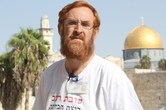
An Israeli court on Thursday dropped indictments against right-wing Israeli activist Yehuda Glick, 18 months after he reportedly assaulted a Palestinian woman at Al-Aqsa Mosque compound.
The decision will likely void a ruling banning Glick from entering the compound, enabling the controversial figure to renew tours for Israelis at the flashpoint site, according to Israeli media reports.
The court reportedly said the testimony of 67-year-old Palestinian Ziva Badarna -- who said she was physically attacked by Glick in August 2014 -- had been fabricated.
Following the ruling, Glick said he “had to face a war in the court,” where he was “fighting against a system meant to protect him, but which was actually working hand in hand with our worst enemies.”
He also pledged to continue visiting the Al-Aqsa Mosque compound as part of his religious duties.
Glick came to prominence for leading groups of rightist Israelis into the mosque compound for worship, in contravention of an agreement between Israel and the Islamic endowment since 1967 that prohibits non-Muslim prayer in the compound.
He has been heavily involved with the Temple Institute, an organization dedicated to building the Third Jewish Temple in the place of the Dome of the Rock.
The Institute is one of a handful of extremist Israeli organizations who critics say have gained serious traction in Israeli Prime Minister Benjamin Netanyahu's right-wing government.
The Dome of the Rock -- located in the Al-Aqsa Mosque compound -- is the third holiest site in Islam, and is venerated as Judaism's most holy place, as it sits where Jews believe the First and Second Temples once stood.
Increased visitation to the site by rightist groups -- like those that Glick facilitates -- last year contributed to an escalation of tensions that triggered a wave of unrest across the Palestinian territory in October.
Despite the court ban placed on Glick from entering the site, he was escorted inside the compound by Israeli guards a handful of times last year.
Palestinian Muataz Hijazi, 32, attempted to assassinate Glick in October 2014 and was shot dead on the roof of his home by Israeli forces hours later. Hijazi’s former bedroom has since been sealed with concrete in a punitive move ordered by Israeli authorities.
The decision will likely void a ruling banning Glick from entering the compound, enabling the controversial figure to renew tours for Israelis at the flashpoint site, according to Israeli media reports.
The court reportedly said the testimony of 67-year-old Palestinian Ziva Badarna -- who said she was physically attacked by Glick in August 2014 -- had been fabricated.
Following the ruling, Glick said he “had to face a war in the court,” where he was “fighting against a system meant to protect him, but which was actually working hand in hand with our worst enemies.”
He also pledged to continue visiting the Al-Aqsa Mosque compound as part of his religious duties.
Glick came to prominence for leading groups of rightist Israelis into the mosque compound for worship, in contravention of an agreement between Israel and the Islamic endowment since 1967 that prohibits non-Muslim prayer in the compound.
He has been heavily involved with the Temple Institute, an organization dedicated to building the Third Jewish Temple in the place of the Dome of the Rock.
The Institute is one of a handful of extremist Israeli organizations who critics say have gained serious traction in Israeli Prime Minister Benjamin Netanyahu's right-wing government.
The Dome of the Rock -- located in the Al-Aqsa Mosque compound -- is the third holiest site in Islam, and is venerated as Judaism's most holy place, as it sits where Jews believe the First and Second Temples once stood.
Increased visitation to the site by rightist groups -- like those that Glick facilitates -- last year contributed to an escalation of tensions that triggered a wave of unrest across the Palestinian territory in October.
Despite the court ban placed on Glick from entering the site, he was escorted inside the compound by Israeli guards a handful of times last year.
Palestinian Muataz Hijazi, 32, attempted to assassinate Glick in October 2014 and was shot dead on the roof of his home by Israeli forces hours later. Hijazi’s former bedroom has since been sealed with concrete in a punitive move ordered by Israeli authorities.
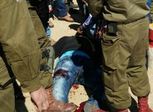
An Israeli settler died of his wounds Friday morning, after having been shot by another Israeli settler who was allegedly trying to 'thwart an attack', according to Israeli sources. The settler also shot and wounded a Palestinian man -- but no one was injured by the alleged Palestinian 'attacker'.
The shootings by the armed paramilitary Israeli settler took place near the Gush Etzion Junction, south of Bethlehem.
Israeli sources identified the Israeli man who was killed as Captain Eliav Gelman, 31, who was discharged only a few months ago from the military.
He was a settler, who lived in one of the extreme right-wing religious Jewish settlements constructed on Palestinian land north of Hebron.
After he was wounded, he was taken to Shaare Tzedek Medical Center. He died on Friday morning from the gunshot wounds inflicted by his fellow Israeli settler.
Israeli daily Haaretz claimed that the shots were fired following an alleged "stabbing attack" by a Palestinian -- but no one was injured by the accused Palestinian, and no knife was found.
The wounded Palestinian has been identified as Mamdouh Yousef Amro, 27, from Doura town, southwest of Hebron.
The shootings by the armed paramilitary Israeli settler took place near the Gush Etzion Junction, south of Bethlehem.
Israeli sources identified the Israeli man who was killed as Captain Eliav Gelman, 31, who was discharged only a few months ago from the military.
He was a settler, who lived in one of the extreme right-wing religious Jewish settlements constructed on Palestinian land north of Hebron.
After he was wounded, he was taken to Shaare Tzedek Medical Center. He died on Friday morning from the gunshot wounds inflicted by his fellow Israeli settler.
Israeli daily Haaretz claimed that the shots were fired following an alleged "stabbing attack" by a Palestinian -- but no one was injured by the accused Palestinian, and no knife was found.
The wounded Palestinian has been identified as Mamdouh Yousef Amro, 27, from Doura town, southwest of Hebron.
25 feb 2016
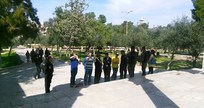
Israeli settlers resumed on Thursday afternoon their provocative break-ins into al-Aqsa Mosque amid heavy police protection.
Nearly 40 extremist settlers stormed after noon prayers the holy shrine via the Israeli-controlled Magharibeh gate, which led to a state of tension among Muslim worshipers.
Meanwhile, Israeli forces continue to impose entry restrictions on Palestinian worshipers, particularly women and youths. Police retain their identity cards prior to their entry in anticipation of any clashes and to be able to detain those who might be involved.
Occupied Jerusalem has witnessed ongoing tension for more than five months in protest against Israeli settlers’ almost daily provocative break-ins into al-Aqsa Mosque. Since then, more than 180 Palestinians were killed by Israeli gunfire, including children and women.
Nearly 40 extremist settlers stormed after noon prayers the holy shrine via the Israeli-controlled Magharibeh gate, which led to a state of tension among Muslim worshipers.
Meanwhile, Israeli forces continue to impose entry restrictions on Palestinian worshipers, particularly women and youths. Police retain their identity cards prior to their entry in anticipation of any clashes and to be able to detain those who might be involved.
Occupied Jerusalem has witnessed ongoing tension for more than five months in protest against Israeli settlers’ almost daily provocative break-ins into al-Aqsa Mosque. Since then, more than 180 Palestinians were killed by Israeli gunfire, including children and women.

Head of the Supreme Islamic Committee (SIC) in Occupied Jerusalem, Ekrema Sabri, said Wednesday that the Israeli occupation authority (IOA) had stepped up aggressions on Muslims’ the holy al-Aqsa Mosque and the Islamic places of worship.
“The Israeli occupation continues to violate the sanctity of Muslims’ al-Aqsa in its ongoing campaign against Islamic holy sites,” said Sabri.
Israeli groups campaigning for illegal settlement turned the sacred Umayyad Palaces into podiums for an Israeli festival and installed kit in the area.
On Tuesday evening Israeli settler groups also filmed a movie at the site despite objections from the Jerusalem Endowment Department. The IOA has further stolen a set of archaeological stones from the Umayyad Palaces claiming they are of Jewish origin.
Sabri further slammed the IOA and settlers for violating the sanctity of sacred places of worship, particularly the holy al-Aqsa Mosque.
“The Israeli occupation continues to violate the sanctity of Muslims’ al-Aqsa in its ongoing campaign against Islamic holy sites,” said Sabri.
Israeli groups campaigning for illegal settlement turned the sacred Umayyad Palaces into podiums for an Israeli festival and installed kit in the area.
On Tuesday evening Israeli settler groups also filmed a movie at the site despite objections from the Jerusalem Endowment Department. The IOA has further stolen a set of archaeological stones from the Umayyad Palaces claiming they are of Jewish origin.
Sabri further slammed the IOA and settlers for violating the sanctity of sacred places of worship, particularly the holy al-Aqsa Mosque.
24 feb 2016
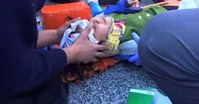
A Palestinian child on Wednesday evening suffered injuries when an Israeli driver deliberately hit her in occupied Jerusalem.
Jerusalemite sources said that a Jewish female settler deliberately rammed her car into the Palestinian girl Raghad Ezzat near Shufat refugee camp in the occupied city and badly injured her.
The settler escaped the scene, while the kid was rushed to Hadassah Ein Kerem Hospital for urgent medical assistance.
Jerusalemite sources said that a Jewish female settler deliberately rammed her car into the Palestinian girl Raghad Ezzat near Shufat refugee camp in the occupied city and badly injured her.
The settler escaped the scene, while the kid was rushed to Hadassah Ein Kerem Hospital for urgent medical assistance.
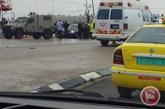
A Palestinian young man was moderately injured after being shot by Israeli Occupation Forces (IOF) Wednesday afternoon over an alleged stabbing attack near the illegal Gush Etzion settlement bloc north of al-Khalil.
An Israeli soldier was pronounced dead during the alleged attack, while the Palestinian suspect suffered moderate injuries.
Israeli media sources said that the Israeli soldier was mistakenly shot by his colleagues during the incident before he succumbed to his wounds. An Israeli army spokesperson identified the soldier as Eliav Gelman, 30.
Palestinian sources, on the other hand, identified the injured Palestinian as Mamdouh Yousef Amr. Israeli soldiers were seen in photos standing over the legs of the injured Palestinian to make sure he does not move.
Earlier Wednesday, Israeli sources declared the arrest of a Palestinian minor for allegedly trying to carry out a stabbing attack in Rahet city within the Green Line in early February. An Israeli settler was injured during the alleged attack.
More than 180 Palestinians have been killed by Israeli forces and settlers since October 1. Israel says the majority were shot dead while attempting to carry out attacks, although international rights groups have disputed Israel's version of events in several cases.
UN Secretary-General Ban Ki-moon said last month it was "human nature for Palestinians to react violently to Israel's nearly 50-year military occupation”, as he urged a change in Israeli policy in the occupied Palestinian territories.
Israeli forces shoot Palestinian, Israeli by accident after alleged attack
Israeli forces shot and wounded a Palestinian man and, accidentally, an Israeli, following an alleged stabbing attempt near the illegal Gush Etzion settlement bloc south of Bethlehem on Wednesday, the Israeli army said.
An Israeli army spokesperson said that Israeli forces opened fire on the Palestinian after he attempted to carry out a stabbing attack. They shot both him and an Israeli accidentally.
The spokesperson said both the Israeli and the Palestinian were evacuated to hospital. A spokesperson for Israel's emergency medical service Magen David Adom said medics were treating one "victim of about 20 (years old) in severe condition."
Israeli news site Haaretz reported that the shots may have been fired by an armed Israeli settler, although this could not initially be verified.
No stabbing wounds were reported.
More than 170 Palestinians have now been killed by Israeli forces and settlers since October. Israel says the majority were shot dead while attempting to carry out attacks, although international rights groups have disputed Israel's version of events in several cases.
The attacks that have taken place -- mostly by Palestinian individuals armed only with knives -- have killed nearly 30 Israelis.
UN Secretary-General Ban Ki-moon said last month it was "human nature" for Palestinians to react violently to Israel's nearly 50-year military occupation, as he urged a change in Israeli policy in the occupied Palestinian territory.
An Israeli soldier was pronounced dead during the alleged attack, while the Palestinian suspect suffered moderate injuries.
Israeli media sources said that the Israeli soldier was mistakenly shot by his colleagues during the incident before he succumbed to his wounds. An Israeli army spokesperson identified the soldier as Eliav Gelman, 30.
Palestinian sources, on the other hand, identified the injured Palestinian as Mamdouh Yousef Amr. Israeli soldiers were seen in photos standing over the legs of the injured Palestinian to make sure he does not move.
Earlier Wednesday, Israeli sources declared the arrest of a Palestinian minor for allegedly trying to carry out a stabbing attack in Rahet city within the Green Line in early February. An Israeli settler was injured during the alleged attack.
More than 180 Palestinians have been killed by Israeli forces and settlers since October 1. Israel says the majority were shot dead while attempting to carry out attacks, although international rights groups have disputed Israel's version of events in several cases.
UN Secretary-General Ban Ki-moon said last month it was "human nature for Palestinians to react violently to Israel's nearly 50-year military occupation”, as he urged a change in Israeli policy in the occupied Palestinian territories.
Israeli forces shoot Palestinian, Israeli by accident after alleged attack
Israeli forces shot and wounded a Palestinian man and, accidentally, an Israeli, following an alleged stabbing attempt near the illegal Gush Etzion settlement bloc south of Bethlehem on Wednesday, the Israeli army said.
An Israeli army spokesperson said that Israeli forces opened fire on the Palestinian after he attempted to carry out a stabbing attack. They shot both him and an Israeli accidentally.
The spokesperson said both the Israeli and the Palestinian were evacuated to hospital. A spokesperson for Israel's emergency medical service Magen David Adom said medics were treating one "victim of about 20 (years old) in severe condition."
Israeli news site Haaretz reported that the shots may have been fired by an armed Israeli settler, although this could not initially be verified.
No stabbing wounds were reported.
More than 170 Palestinians have now been killed by Israeli forces and settlers since October. Israel says the majority were shot dead while attempting to carry out attacks, although international rights groups have disputed Israel's version of events in several cases.
The attacks that have taken place -- mostly by Palestinian individuals armed only with knives -- have killed nearly 30 Israelis.
UN Secretary-General Ban Ki-moon said last month it was "human nature" for Palestinians to react violently to Israel's nearly 50-year military occupation, as he urged a change in Israeli policy in the occupied Palestinian territory.
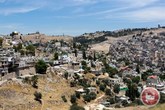
The Ateret Cohanim settlement organization delivered a judicial ruling to the Palestinian al-Rajabi family to evacuate their homes in Silwan town, in Occupied Jerusalem, at the pretext it was owned by Jews.
The Wadi Hilweh Information Center said in a statement the Ateret Cohanim organization ordered the al-Rajabi family to give up a land where two six-storey buildings of the family’s own were built.
The organization said the family has to respond to the lawsuit, which claimed the land had been owned to three Yemenite Jews before 1948, within 30 days.
Wadi Hilweh Information Center said the targeted land makes part of the intent of Ateret Cohanim to confiscate nearly five dunums and 200 square meters under the pretext of being owned by the Jews of Yemen since 1881.
The settlement organization claimed that the Israeli Supreme Court approved the ownership of settlers from Yemen to lands in Batn Al-Hawa.
Wadi Hilweh Center added that the lands at risk of being confiscated currently have 30 to 35 residential apartments that are homes to 80 Palestinian families comprising nearly 436 individuals in total. All the residents have been living in the neighborhood since the 1960’s after they bought the lands and property from the previous owners using official documents.
Palestinian families in Silwan receive evacuation notices
A Palestinian family in the occupied East Jerusalem neighborhood of Silwan on Tuesday received a court notice for eviction following efforts by right-wing group Ateret Cohanim to take over their land, according to the Wadi Hilweh Information Center.
The Silwan-based center said in a statement that Ateret Cohanim brought to court their claim over land belonging to the Awad Abdul-Fattah al-Rajabi and Abdul-Fattah Jaber al-Rajabi families.
Ateret Cohanim -- an organization that aims to create a Jewish majority in occupied East Jerusalem at the expense of Palestinian communities -- claims the land was owned by three Yemenite Jews prior to 1948.
The eviction would displace at 28 members of the al-Rajabi family who live in two buildings on the property, located in the Baten al-Hawa area of the neighborhood, including at least 12 children. The buildings stand on a plot just over five dunams (0.296 acres).
Kayed al-Rajabi, member of the neighborhood committee, said the family was given 30 days to provide evidence of their ownership of the land to an Israeli court.
Attempts to take over the property are part of a bigger plan by Ateret Cohanim to seize 5,200 square meters in the central quarter of Baten al-Hawa, the Wadi Hilweh Center said, adding that the move would displace 436 Palestinian residents who legally purchased the land.
Peace Now reported that in 2015, Israeli settlers doubled their presence in Batan al-Hawa, joining around 500 Israeli settlers living in Silwan among a population of 45,000 Palestinians.
Silwan is one of many Palestinian neighborhoods in East Jerusalem to face ongoing state-sanctioned efforts to create a Jewish majority since Israel illegally occupied the city in 1967.
Following a major takeover of Palestinian homes by Ateret Cohanim last year, the PLO slammed what it termed Israel's "systematic ethnic cleansing of Palestinians" in Silwan.
The PLO said that Israeli policies "in Silwan aim not only to alter the historic character of the area and to consolidate Israeli control over the Old City of Jerusalem ... but also contribute to the systematic ethnic cleansing of Palestinians in occupied East Jerusalem."
The Wadi Hilweh Information Center said in a statement the Ateret Cohanim organization ordered the al-Rajabi family to give up a land where two six-storey buildings of the family’s own were built.
The organization said the family has to respond to the lawsuit, which claimed the land had been owned to three Yemenite Jews before 1948, within 30 days.
Wadi Hilweh Information Center said the targeted land makes part of the intent of Ateret Cohanim to confiscate nearly five dunums and 200 square meters under the pretext of being owned by the Jews of Yemen since 1881.
The settlement organization claimed that the Israeli Supreme Court approved the ownership of settlers from Yemen to lands in Batn Al-Hawa.
Wadi Hilweh Center added that the lands at risk of being confiscated currently have 30 to 35 residential apartments that are homes to 80 Palestinian families comprising nearly 436 individuals in total. All the residents have been living in the neighborhood since the 1960’s after they bought the lands and property from the previous owners using official documents.
Palestinian families in Silwan receive evacuation notices
A Palestinian family in the occupied East Jerusalem neighborhood of Silwan on Tuesday received a court notice for eviction following efforts by right-wing group Ateret Cohanim to take over their land, according to the Wadi Hilweh Information Center.
The Silwan-based center said in a statement that Ateret Cohanim brought to court their claim over land belonging to the Awad Abdul-Fattah al-Rajabi and Abdul-Fattah Jaber al-Rajabi families.
Ateret Cohanim -- an organization that aims to create a Jewish majority in occupied East Jerusalem at the expense of Palestinian communities -- claims the land was owned by three Yemenite Jews prior to 1948.
The eviction would displace at 28 members of the al-Rajabi family who live in two buildings on the property, located in the Baten al-Hawa area of the neighborhood, including at least 12 children. The buildings stand on a plot just over five dunams (0.296 acres).
Kayed al-Rajabi, member of the neighborhood committee, said the family was given 30 days to provide evidence of their ownership of the land to an Israeli court.
Attempts to take over the property are part of a bigger plan by Ateret Cohanim to seize 5,200 square meters in the central quarter of Baten al-Hawa, the Wadi Hilweh Center said, adding that the move would displace 436 Palestinian residents who legally purchased the land.
Peace Now reported that in 2015, Israeli settlers doubled their presence in Batan al-Hawa, joining around 500 Israeli settlers living in Silwan among a population of 45,000 Palestinians.
Silwan is one of many Palestinian neighborhoods in East Jerusalem to face ongoing state-sanctioned efforts to create a Jewish majority since Israel illegally occupied the city in 1967.
Following a major takeover of Palestinian homes by Ateret Cohanim last year, the PLO slammed what it termed Israel's "systematic ethnic cleansing of Palestinians" in Silwan.
The PLO said that Israeli policies "in Silwan aim not only to alter the historic character of the area and to consolidate Israeli control over the Old City of Jerusalem ... but also contribute to the systematic ethnic cleansing of Palestinians in occupied East Jerusalem."
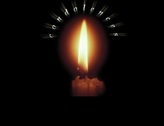
Zainab Rashayda 60
Palestinian medical sources have reported that a Palestinian woman was killed on Tuesday night, and her daughter was moderately wounded, after being struck by a speeding Israeli settler’s car on the al-‘Oja road, in the Southern Pains of the Jericho district.
The WAFA Palestinian News Agency said the woman has been identified as Zainab Rashayda, 60, and that her daughter, Fatima Abed Yassin, 30, suffered moderate wounds and was moved to the Jericho governmental hospital.
Palestinian Police spokesperson lieutenant Luay Erzeiqat said that the Police were informed about an Israeli car that rammed the woman and they initiated an investigation. However, the area where the incident took place is under full Israeli control, so the Palestinian police are prevented from investigating.
Jericho Governor Majed al-Fityani told the Maan News Agency that the Israeli police tracked the driver down, and apprehended him. Israeli sources said the driver phoned the police, and informed them of his location.
Red Crescent medics moved the deceased woman, and her wounded daughter, to the Jericho Hospital.
There have been dozens of incidents where Palestinians, including children and elderly, were killed after being rammed by speeding Israeli settlers, in different parts of the occupied West Bank, and dozens injured in similar incidents, but the Israeli army never apprehended them, or even opened credible investigations.
In October of 2014, a child identified as Enas Shawkat Dar Khalil, only five years of age, was killed, and her friend Tulin Omar ‘Asfour, 5, was seriously injured, after an Israeli settler rammed them with his car, near Sinjil town, located near the Central West Bank city of Ramallah.
On September 2, 2015, a Palestinian shepherd was injured, and eight of his sheep were killed, after being rammed with a speeding settler's car, east of Yatta, in the southern West Bank city of Hebron.
On November 15, 2015, a 2-year-old toddler was injured after an Israeli military vehicle struck him in Bir Niabala town, northwest of occupied Jerusalem, while a Palestinian woman was also injured in a similar incident in Ramallah.
Related Articles:
Israeli settler runs over Palestinian youngster in Salfit
Israeli Settler Runs Over Hebron Child With Car
Child Injured After Being Rammed By Settler’s Car Near Hebron
Child Seriously Injured After Being Struck By Settler’s Car In Hebron
Bethlehem Area: 3 Palestinian Youth Kidnapped, Settler Runs Over Teen
Palestinian medical sources have reported that a Palestinian woman was killed on Tuesday night, and her daughter was moderately wounded, after being struck by a speeding Israeli settler’s car on the al-‘Oja road, in the Southern Pains of the Jericho district.
The WAFA Palestinian News Agency said the woman has been identified as Zainab Rashayda, 60, and that her daughter, Fatima Abed Yassin, 30, suffered moderate wounds and was moved to the Jericho governmental hospital.
Palestinian Police spokesperson lieutenant Luay Erzeiqat said that the Police were informed about an Israeli car that rammed the woman and they initiated an investigation. However, the area where the incident took place is under full Israeli control, so the Palestinian police are prevented from investigating.
Jericho Governor Majed al-Fityani told the Maan News Agency that the Israeli police tracked the driver down, and apprehended him. Israeli sources said the driver phoned the police, and informed them of his location.
Red Crescent medics moved the deceased woman, and her wounded daughter, to the Jericho Hospital.
There have been dozens of incidents where Palestinians, including children and elderly, were killed after being rammed by speeding Israeli settlers, in different parts of the occupied West Bank, and dozens injured in similar incidents, but the Israeli army never apprehended them, or even opened credible investigations.
In October of 2014, a child identified as Enas Shawkat Dar Khalil, only five years of age, was killed, and her friend Tulin Omar ‘Asfour, 5, was seriously injured, after an Israeli settler rammed them with his car, near Sinjil town, located near the Central West Bank city of Ramallah.
On September 2, 2015, a Palestinian shepherd was injured, and eight of his sheep were killed, after being rammed with a speeding settler's car, east of Yatta, in the southern West Bank city of Hebron.
On November 15, 2015, a 2-year-old toddler was injured after an Israeli military vehicle struck him in Bir Niabala town, northwest of occupied Jerusalem, while a Palestinian woman was also injured in a similar incident in Ramallah.
Related Articles:
Israeli settler runs over Palestinian youngster in Salfit
Israeli Settler Runs Over Hebron Child With Car
Child Injured After Being Rammed By Settler’s Car Near Hebron
Child Seriously Injured After Being Struck By Settler’s Car In Hebron
Bethlehem Area: 3 Palestinian Youth Kidnapped, Settler Runs Over Teen
